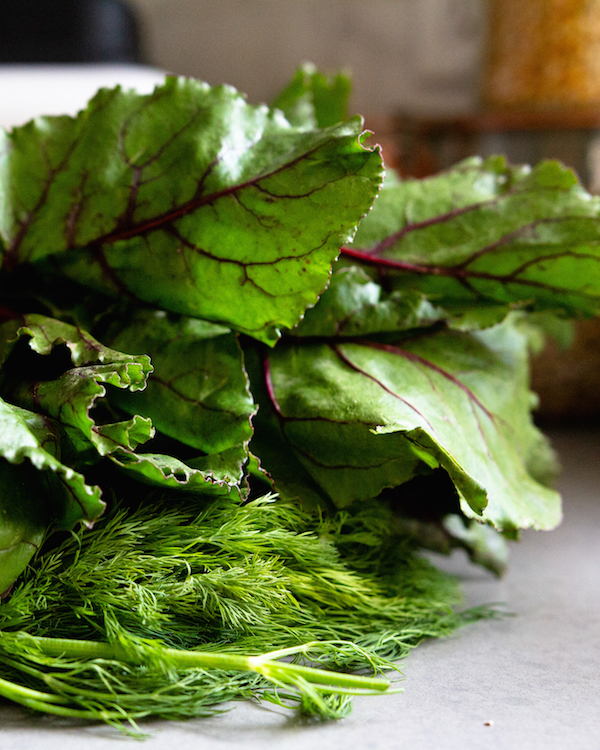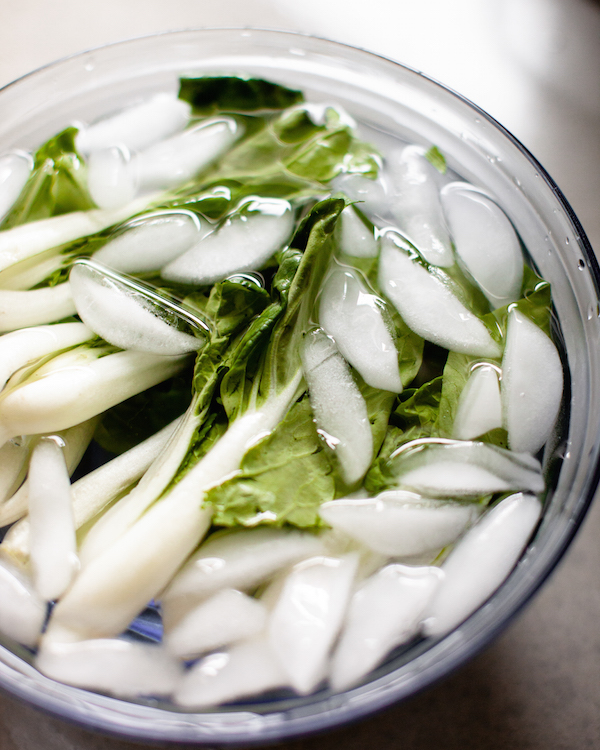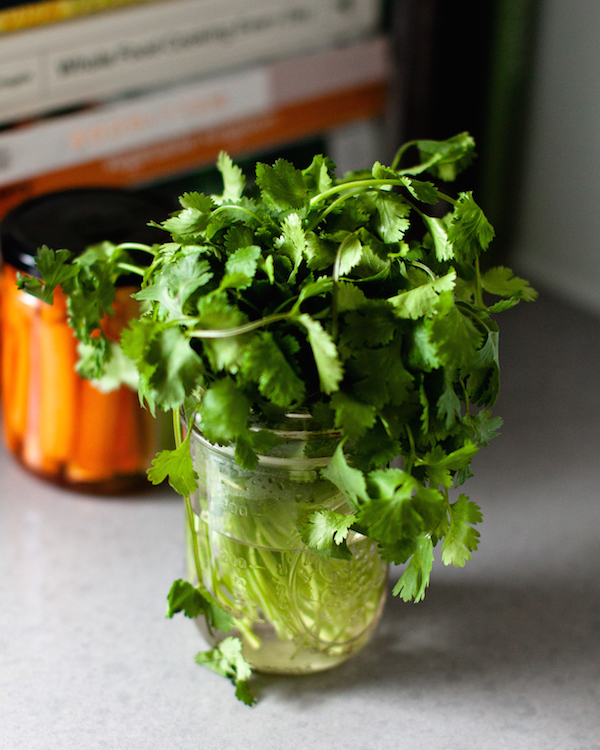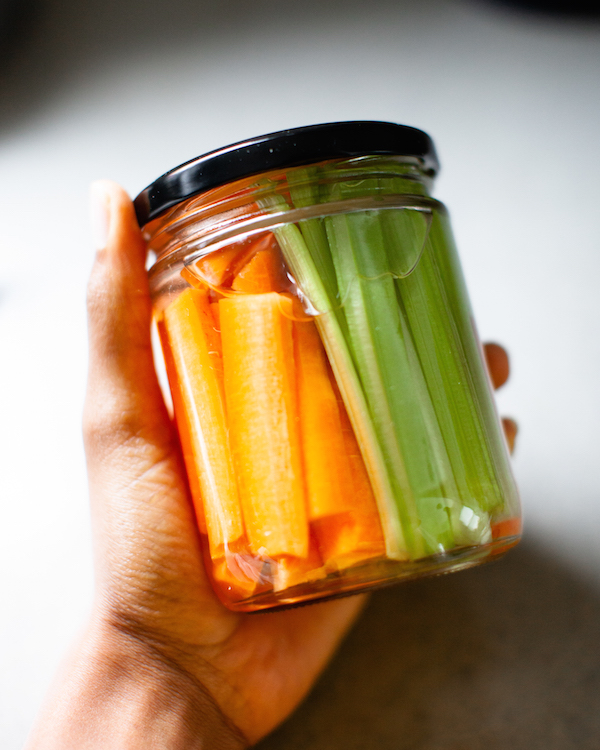I hope you’re coping well, and staying healthy despite our present circumstances worldwide. For me, every day seems to go by quickly, and yet I feel like we’ve been social distancing for a year. I miss the way it was before: going for hikes on the weekend, leisurely shopping at the farmer’s market, giving my friends and family big hugs when I saw them. And I especially miss not having to worry that my family might get sick. The daily anxiety over that is so hard to bear. Yet, like most of us, I am coping and finding joy and ease in this new way of life. We won’t be wearing face masks forever.
Like many of you, we’ve reduced the frequency with which we grocery shop. We stock up on what we need every 7-10 days, and do our best to use it up slowly. Since fresh produce is the number one food group we consume, I try to make it last as long as possible. The tips below are what I follow to make our produce last longer. These tips will help save you trips to the market and save money because you’ll have less food waste (a wonderful thing despite saving money). After reading this post and watching the video, I recommend checking out my post and video on utilizing food scraps, and one about making your own vegetable broth with scraps.
VIDEO VIDEO VIDEO
Don’t wash produce until you’re ready to use it
This especially goes for soft and thin-skinned produce like greens, berries, tomatoes, and cruciferous vegetables. Just like your skin, fresh produce has a balance of good bacteria and fungi on it. Once you wash it it has a tendency to spoil more quickly because you’ve removed part of it’s protective barrier. Also, introducing water to dry vegetables makes it go bad quicker because mold and bacteria thrive in wet environments. If you must wash it when you bring it home, dry it well then store in the refrigerator to slow the growth of mold and bacteria. I know, this can be a hard one in the midst of a global pandemic. However, according to the CDC you’re more likely to get and spread Covid-19 from person to person contact.
Store washed greens with a paper towel to absorb moisture
If you must wash your greens––which really is helpful for weekly food prep––then make sure to dry them thoroughly and store them in a container or plastic baggie with a sheet of paper towel or absorbent cloth (see video). As the greens release moisture into their storage container they may go bad quickly. Storing them with a paper towel or cloth will help absorb any excess water that the greens “sweat”, and make your produce last longer. Switch out the towel every 2 days or when damp.
Store herbs and greens like flowers
Just like bringing home freshly cut flowers, you can store your herbs and vegetables in water. Place the greens or herb stems into a jar of water, and cover with a plastic bag and store in the refrigerator. The plastic bag helps to keep the vegetables from drying out and wilting in the fridge. For herbs or greens that aren’t super fresh, you can try cutting the base of the stems to encourage them to absorb more water when stored.

Freshen produce in ice water
There’s nothing like an ice cold bath to shock you awake. Same is true for vegetables. This trick works best with herbs and leafy greens. Place them in a bowl of ice water for 5-10 minutes and watch them come back to life. If your produce has yellowed or dried out this won’t work. Compost it.
Make sure your veggies are in the appropriate crisper drawer
You know the two drawers at the bottom of your refrigerator? Those are called crisper drawers. You put your veggies and fruits in there not only for organization, but because you can set the humidity level and keep them fresh. You’ll notice there is a little tiny window of sorts that you can open and close. Greens, herbs, and other soft vegetables that wilt should be kept on the high humidity setting. Hard vegetables and fruits like apples and beets should be kept on low humidity. Here’s a detailed guide by The Kitchn.
Cut the tops off beets, carrots, etc
…but please don’t throw them away! You can and should be eating most vegetable tops like beet greens, carrot tops, turnip greens, and even radish tops. However, they should be stored separately from their roots, or else the root will soften quickly. Cut the roots off the greens, and store the roots (beets, carrots, turnips, radish, etc) in the low humidity crisper drawer, and store the greens in the high humidity drawer.
Prep & store crunchy things in water
If you like to prep carrots, celery, even apples to have as an easy snack, cut them and store in a jar with water. The water will help prevent them from oxidizing and going bad, and it will keep them crisp and fresh. This trick can be used on any hard or crunchy fruits or vegetables. For even more flavor, try a quick pickle by storing them in apple cider vinegar with a bit of sugar, salt, and herbs.
Keep citrus in fridge
This is for if you have a surplus. I’ve been stocking up on 25lb bags of juicy oranges every couple weeks from the farmer’s market. There’s no way we can eat that many oranges before they start getting moldy, so we store most of them in the fridge. I don’t like cold citrus, so once our room-storage oranges are eaten up, I take some more out of the fridge. No more moldy oranges! Of course this works with other citrus too.
Freeze ginger
I use a lot of ginger. Especially now that I’ve been focused on supporting a healthy immune system. I’m sure you’ve experienced ginger drying out and getting stringy when kept at room temperature. Keep any excess ginger in the freezer. You can thaw it later to use, or grate it into dishes and tea straight from the freezer. I store mine in a plastic baggie or aluminum foil (see video for example).
Store potatoes and onions in a cool, dry, dark place, but not together
Nope, potatoes and onions should not be stored together. The gases they each give off will make them go bad more quickly. So keep them separate. However, they should both be stored in a cool, dark, dry place. I store mine in the dark corner of my kitchen. Plenty of air flow, and not too much light.
What other tips do you have to make produce last longer? Share them in the comments below!
The post How to Make Produce Last Longer appeared first on Sweet Potato Soul by Jenné Claiborne.
from Sweet Potato Soul by Jenné Claiborne https://sweetpotatosoul.com/2020/04/how-to-make-produce-last-longer.html
via Danmeri



No comments:
Post a Comment